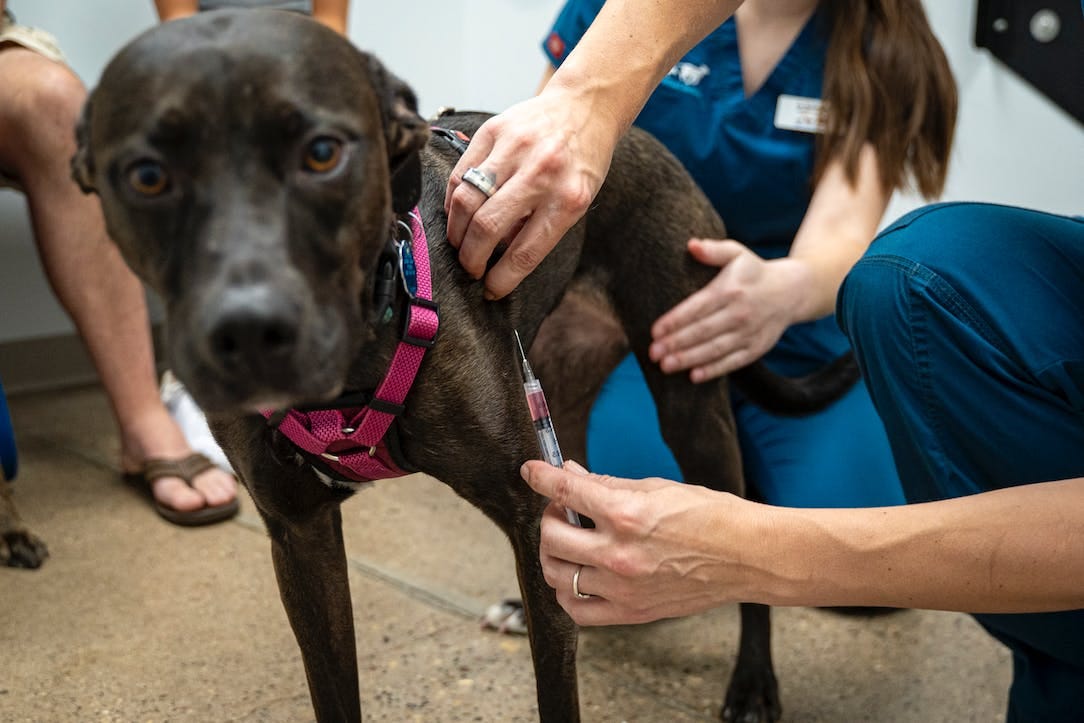Most Americans skeptical about canine vaccines, which threatens dogs
News and headlines for August 26 - September 1, 2023

These are some of the stories making headlines in animal protection:
Oregon became the latest state to ban the sale of commercially-bred dogs and cats in pet stores. It joins California, New York, Maryland, Maine, Illinois, and hundreds of cities and counties nationwide. Such laws do three things:
Encourage people to adopt/rescue;
Educate the community about dog and cat (and rabbit) abuse in mills;
Stop that abuse.
And they work. Thanks to their passage, the number of commercial breeders in the U.S. has declined by 30%, and “Nebraska Department of Agriculture records show that half of the state’s commercial dog and cat breeders have left the business.”
Pet stores generally get their animals from Commercial Breeding Enterprises (CBEs), commonly called “puppy mills.” CBEs engage in systematic neglect and abuse of animals, leaving severe emotional and physical scars on the victims. One in four former breeding dogs have significant health problems, are more likely to suffer from aggression, and are psychologically and emotionally shut down, compulsively staring at nothing.
Oregon’s governor also signed legislation that “bans the sale of cosmetics that have been subjected to new animal testing. Oregon is now in line with more than 30 countries and 10 states (California, Hawaii, Illinois, Louisiana, Maine, Maryland, Nevada, New Jersey, New York and Virginia)” that have done the same.
Oregon will also provide $1 million “to support pet-friendly homeless and domestic violence shelters, removing obstacles to safe refuge and supplying vital resources for people in need who have pets.”
The lack of pet-friendly domestic violence shelters keeps animals and women in harm’s way. Most victims report that their companion animals are also abused or threatened with abuse, and 97% of victims reported that keeping their pets with them is essential in deciding whether to seek shelter. Of those, half said they would definitely “not consider shelter for themselves if they could not take their pets with them.”
Unfortunately, less than 10% of domestic violence in the U.S. shelters allow pets. The Oregon grant is a welcome step to change that.
This week was the birthday of the late Henry Bergh, the 19th Century animal advocate who incorporated the nation’s first SPCA and helped launch the humane movement in North America.
After getting New York to pass an anti-cruelty law, he put a copy in his pocket and took to the streets that night and every night after that for the remainder of his life — to help animals and punish abusers.
The annals of the time describe what happened next:
The driver of a cart laden with coal is whipping his horse. Passersby on the New York City street stop to gawk not so much at the weak, emaciated equine, but at the tall man, elegant in top hat and spats, who is explaining to the driver that it is now against the law to beat one’s animal. Thus, America first encounters “The Great Meddler.”
Although he is not well-known, we and the animals greatly owe him. Every humane society that stands up for animals, every animal protection group that gives voice to the voiceless, and the millions of animals who have been saved thanks to the efforts of activists and advocates are a legacy to his life. Bergh was one of the first Americans to begin weaving the ideals of animal protection into our jurisprudence, the American psyche, and the fabric of American life.
After weeks of being denied access to the Maui burn zone, rescuers were finally allowed to enter and look for missing, hungry, thirsty, sick, and injured pets. It took the threat of a lawsuit and national condemnation.
As The Washington Post explained,
Animal rescue workers have not been allowed into the burned area in Maui for two weeks to search for pets who may have survived wildfires this month — and now they say time is probably running out to rescue the animals alive.
A cadre of animal services workers from across the country assembled in Maui for a routine search-and-rescue operation, but they were surprised to be denied access to the burn zone…
Maui and other Hawaii officials falsely stated no animals were in the burn zone. But the Maui Humane Society had a list of at least 1,100 missing animals, hundreds of animals were trapped along the perimeter of the zone, some could be seen inside the fence of the burn zone, and residents were tracking their animals in the burn zone using Air Tags.
The ineptness and cruelty of Maui officials cost animals their lives. One veterinarian who assisted wrote that “animals were in much worse condition than the animals that I had seen just a few days prior. The animals coming in were in critical condition not because of their original injuries/burns but rather due to dehydration and the length of time they had been left in the burn zones. In other words, animals that could have been saved no longer could be.”






